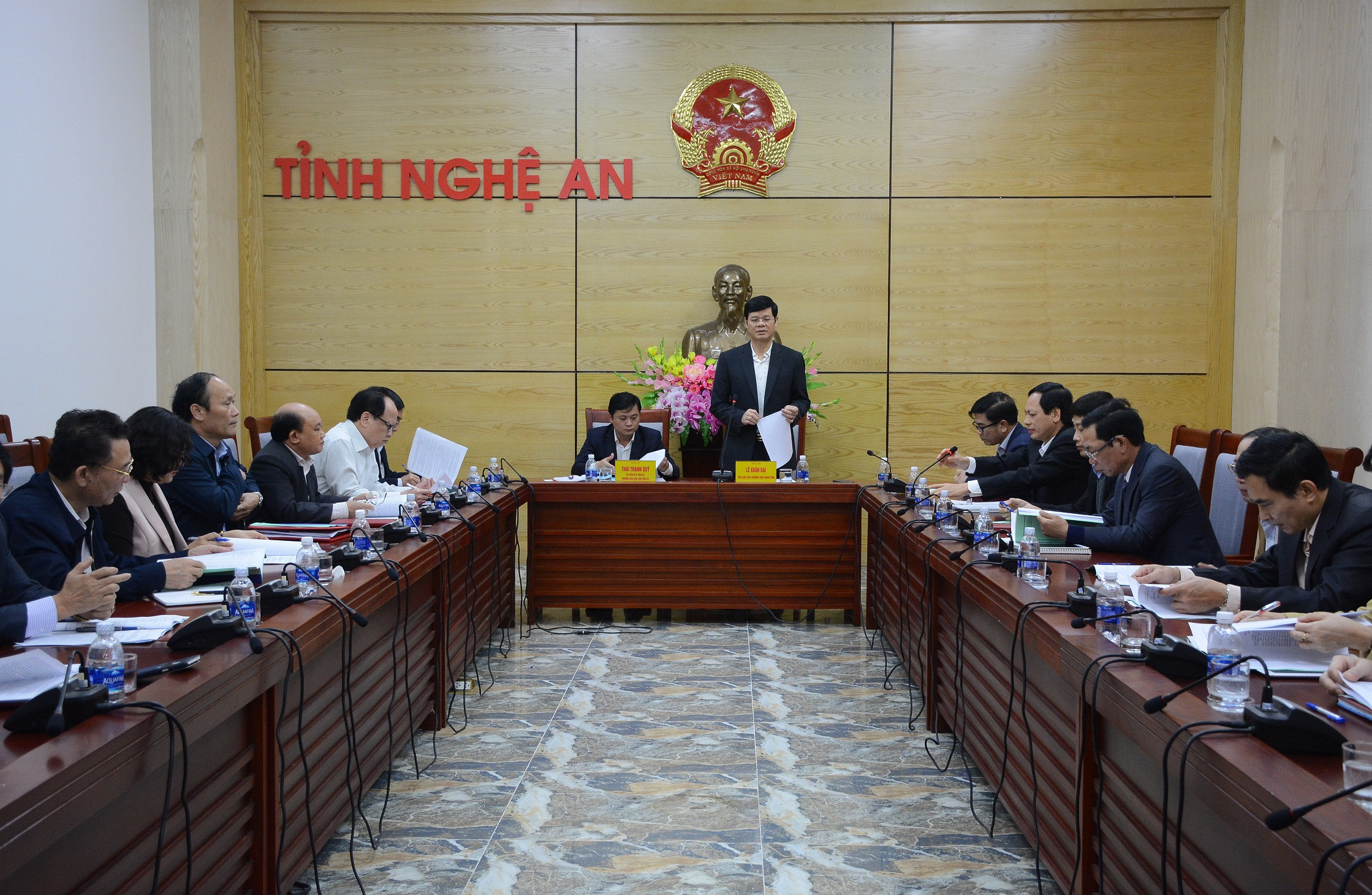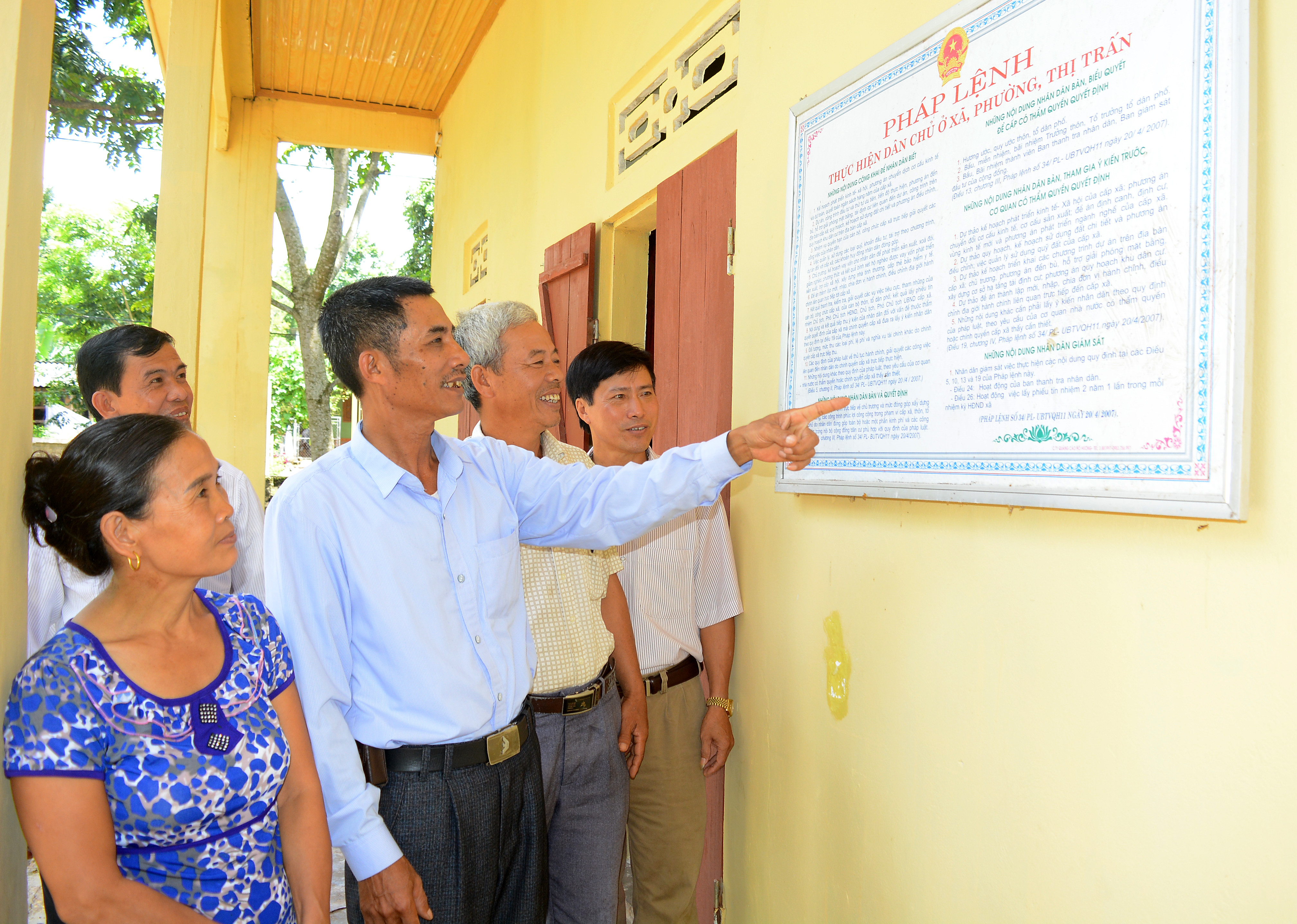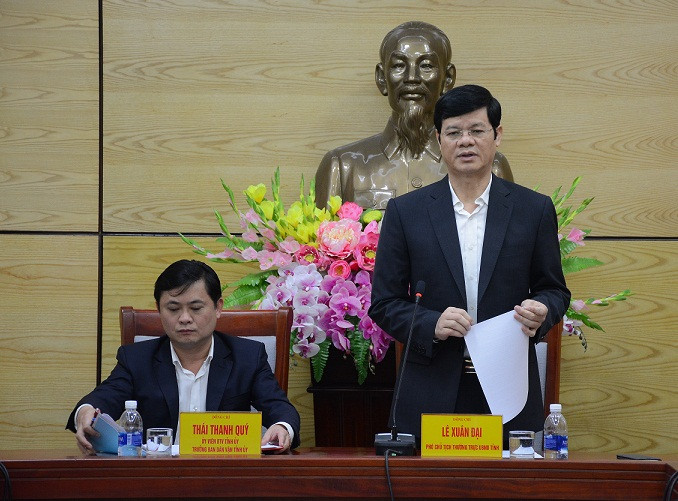Collecting funds: One item cannot be collected twice.
(Baonghean.vn) - Speaking at the conference of the Steering Committee for implementing grassroots democracy regulations, comrade Nguyen Thi Hong Hoa - Principal of the Provincial Political School said that it is necessary to rectify the phenomenon of localities collecting the same fund content twice.
 |
| Conference scene. Photo: Thu Giang |
On the morning of January 23, the Steering Committee for the Implementation of Democracy Regulations (QCDC) at the grassroots level in Nghe An province held a conference to summarize and evaluate activities in 2017 and set out directions and tasks for 2018.
Comrades: Le Xuan Dai - Member of the Provincial Party Standing Committee, Permanent Vice Chairman of the Provincial People's Committee, Head of the Steering Committee for implementing the QCDC at the provincial grassroots level and Thai Thanh Quy - Alternate member of the Party Central Committee, Member of the Standing Committee, Head of the Provincial Party Committee for Mass Mobilization, Deputy Head of the Steering Committee for implementing the QCDC at the provincial grassroots level chaired.
Transparency of income and expenditure
One of the contents that many delegates were interested in discussing at the conference was the implementation of democracy in revenue and expenditure at localities.
Principal of the Provincial Political School Nguyen Thi Hong Hoa said that through the inspections of QCDC at the grassroots level in 2017 according to Plan 628/KH-UBND of the Provincial People's Committee, it was found that the implementation of collecting funds in some places still had the situation of collecting the same content twice.
“Cadres and civil servants have paid that amount at their workplace, but when they return to their wards and communes, they are charged again. In addition, many units continue to have documents assigning collection targets for various funds, which is contrary to the spirit of Directive 15 of the Provincial Party Committee Standing Committee and needs to be corrected immediately,” said Ms. Hoa.
As a member of the Steering Committee for implementing QCDC at the provincial level, the Principal of the Provincial Political School also reflected on the shortcomings in the socialization of education in many places.
“Many people are not satisfied with the revenue and expenditure. Many facilities even proposed to go back to collecting money for school construction to pay into the State budget. Then, the expenditure would be from the State budget, with censorship so that people feel reasonable and secure,” Ms. Hoa reflected.
Agreeing with this opinion, Chairman of the Vietnam Fatherland Front Committee of Nghe An province Nguyen Van Huy stated that the socialization of schools in some places has shown signs of imposition, high collection, and incorrect spending. Besides, the mobilization of people's strength in some localities, although democratic, is still large, even beyond the people's capacity.
For example, there are localities that collect an average of 1 million VND/person, including those under 5 years old or over 60 years old. Mr. Nguyen Van Huy said: "Mobilization must be based on the average living standards of the people, to avoid creating too great a burden."
The head of the Provincial Fatherland Front Committee also warned that if there are loopholes in mobilizing people's strength, it is easy to create incidents and hot spots for bad elements to take advantage of, so it is necessary to regularly check and review to rectify this problem.
 |
| Posting the summary of Decree 34 at Phu Hoa hamlet, Nghia Phu commune, Nghia Dan district. Photo: Thu Giang |
Strengthening dialogue with businesses and people
Besides some shortcomings, according to the head of the Provincial Fatherland Front Committee, the highlight of the past year was that Decree 34 coming into effect created an atmosphere of consensus and high unity among the people, positively impacted socio-economic development, most clearly demonstrated in the construction of new rural areas in localities.
"The Vietnam Fatherland Front channel's assessment of people's satisfaction is basically good. This year's assessment is very realistic, does not embellish achievements, and dares to look directly at shortcomings," Mr. Huy excitedly shared.
He said that the above results were achieved thanks to the Party committees at all levels paying attention to and attaching importance to the implementation of the QCDC at the grassroots level, having directive documents, annually listening to and deeply evaluating the implementation results; paying attention to implementing Directive 05 of the Politburo and Resolution of the Central Committee 4 (term XII).
Along with that, the government has also paid attention to administrative reform, creating very clear changes, and the satisfaction of people and businesses has improved a lot.
Localities have done a very good job of dialogue, helping to promptly detect problems right at the grassroots level, so that all people can reflect their thoughts and aspirations, and make urgent recommendations in residential areas; contributing to reducing outstanding and urgent problems, and reducing the number of petitions and recommendations from the people.
“Dialogue is also an opportunity to test the staff such as the Chairman of the People's Committee and People's Council at the grassroots level. If anyone has a high sense of responsibility, they will do their best. If not, they are very afraid of dialogue,” said Mr. Nguyen Van Huy.
Meanwhile, regarding the organization of dialogues in enterprises, Chairman of the Provincial Labor Federation Nguyen Tu Phuong frankly pointed out the difficulties, because many enterprises are busy with production and business, making it difficult to organize dialogues. However, the number of 60-70% of enterprises that have implemented this content is considered a great effort, the basis for more efforts in the coming time.
Mr. Phuong added that the form of dialogue in enterprises has also been "softened", saving more time. For example, instead of implementing the regulation of dialogue once every 3 months, enterprises and employees proactively sit down together when problems arise.
Or some units are flexible by transferring opinions to the employer via written documents for immediate response, without waiting or delay.
 |
| Standing Vice Chairman of the Provincial People's Committee Le Xuan Dai gave a directive speech. Photo: Thu Giang |
5 key tasks in 2018
Concluding the conference, Standing Vice Chairman of the Provincial People's Committee Le Xuan Dai acknowledged the results of implementing QCDC in all forms at the grassroots level, creating favorable conditions and contributing to the work of Party building, government building and an increasingly strong political system.
In addition, the Head of the Steering Committee for the implementation of the QCDC at the provincial level also pointed out the shortcomings and limitations that need to be promptly overcome: “The Steering Committee for the implementation of the QCDC at the grassroots level in some places operates irregularly and has limited quality. The working style and manner of some officials and civil servants are still limited and flawed; the reform of administrative procedures is still inadequate, causing obstacles and inconvenience to people and businesses. Some businesses have not yet developed and implemented the QCDC, lacking transparency and democracy in production, business, wages, etc.”
Comrade Le Xuan Dai directed members to pay attention to deploying and performing well 5 key tasks in 2018, including: Strengthening the leadership of Party committees, implementation of the government, the Fatherland Front and organizations in implementing the grassroots level democracy; implementing the grassroots level democracy well in conjunction with Directive 05 of the Politburo, the "Skilled Mass Mobilization" movement; implementing Resolution 4 of the Central Committee (12th tenure), Decision 290 of the Politburo; enhancing direct dialogue between leaders and the people; continuing to improve and innovate the activities of steering committees at all levels.
